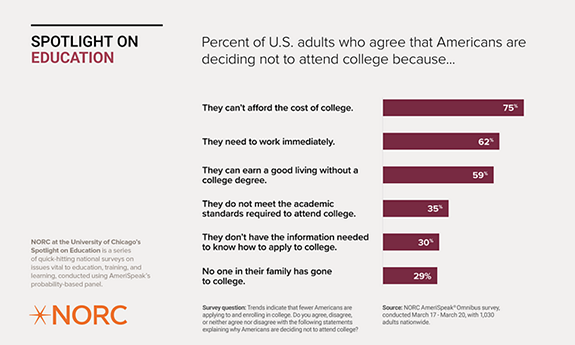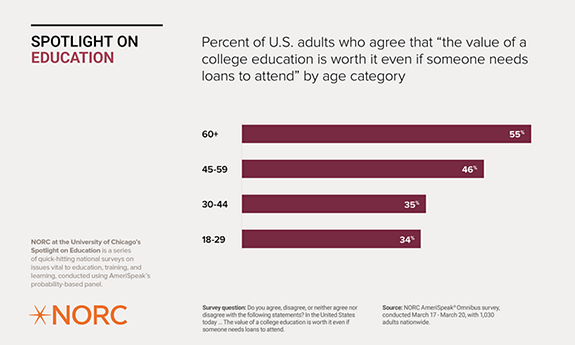Survey: Americans See Cost as the Biggest Barrier to Higher Education
Most Americans believe any student who is accepted to college should be able to attend whether or not they can afford it.
CHICAGO, May 3, 2022 — Americans believe cost is the primary reason people do not go to college, according to a new NORC survey. Seventy-five percent of Americans believe people do not attend college because they cannot afford it. Beyond the price tag, many believe that students may need to work immediately (62%), and more than half (59%) say that Americans could earn a good living without a college degree. The findings come from the latest NORC Spotlight on Education survey powered by AmeriSpeak®.
Experts from NORC at the University of Chicago say experience with higher education shapes opinions about its costs. Concerns about cost being the primary hurdle increased with people’s education, from 58% for those without a high school diploma to 81% for those with a bachelor’s degree or more.


“While all students may not be ready for college, this poll suggests that the cost and ability to pay for college is top of mind for many Americans,” said Jaunelle Pratt-Williams, senior research scientist at NORC. “Many of our survey respondents agree that the cost of college holds people back from pursuing higher education.”
Survey results showed most Americans think people are prepared to go to college. Only 35% say that people did not go because they did not meet the necessary academic standards. Slightly less than a third (29%) say that the decision not to go was made because no other family member attended.


When told that some high schools have dual enrollment programs that allow students to take college-level courses while students are still in high school, 82% of Americans said they would support dual enrollment to reduce college costs. “Americans want to know how we can bring down the cost for everyone,” said Pratt-Williams. “With dual enrollment, students can enter college with the equivalent of a semester or more of earned college credits. This head start reduces the amount of time that they would need to be enrolled and thus, also reduces the cost.”
Methodology
The self-funded poll was conducted between March 17 and 20, 2022, during a monthly Omnibus survey. It included 1,030 interviews with a nationally representative sample (margin of error +/- 4.04 percent) of adult Americans age 18+ using the AmeriSpeak® Panel. AmeriSpeak is NORC’s probability-based panel designed to be representative of the U.S. household population.
About the NORC Spotlight on Education
NORC’s Spotlight on Education is a series of quick-hitting national surveys on issues vital to education and its place in society, conducted using AmeriSpeak’s probability-based panel.
About NORC at the University of Chicago
NORC at the University of Chicago conducts research and analysis that decision-makers trust. As a nonpartisan research organization and a pioneer in measuring and understanding the world, we have studied almost every aspect of the human experience and every major news event for more than eight decades. Today, we partner with government, corporate, and nonprofit clients around the world to provide the objectivity and expertise necessary to inform the critical decisions facing society.
Contact: For more information, please contact Eric Young at NORC at young-eric@norc.org or (703) 217-6814 (cell).





